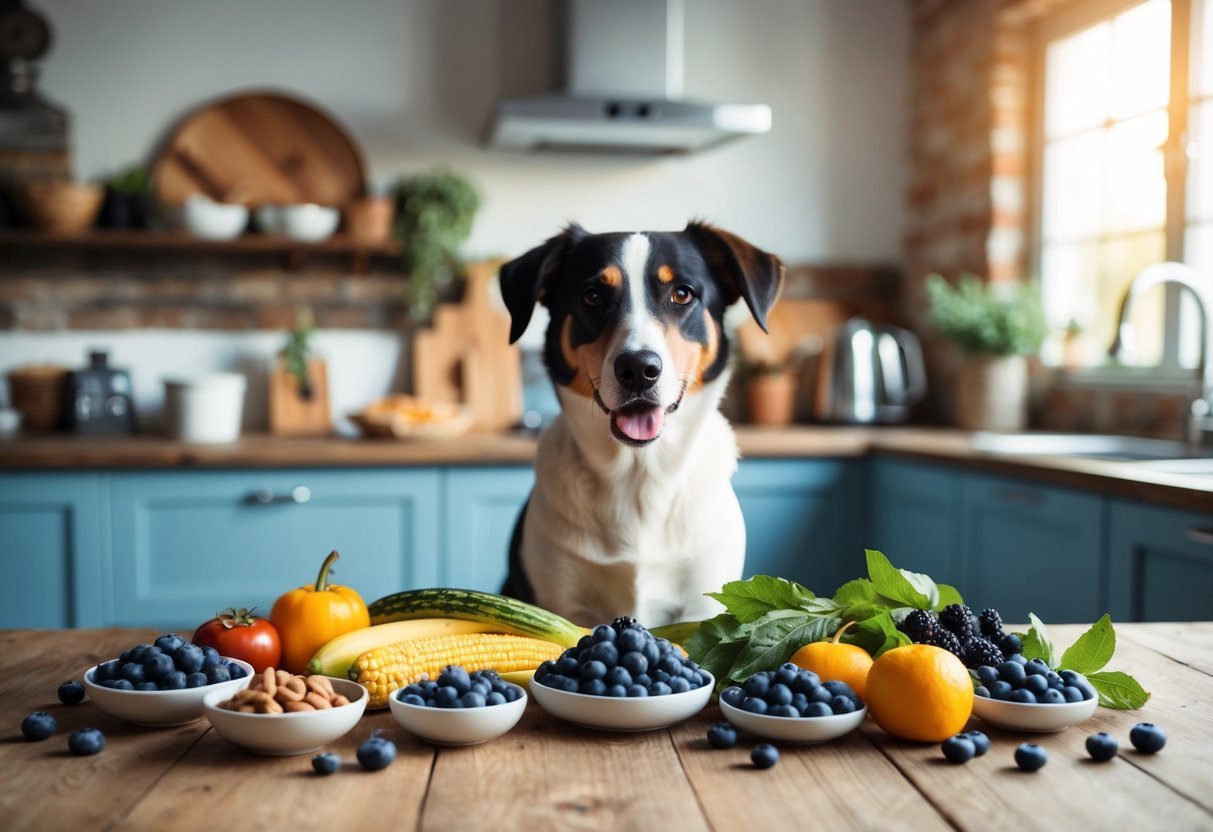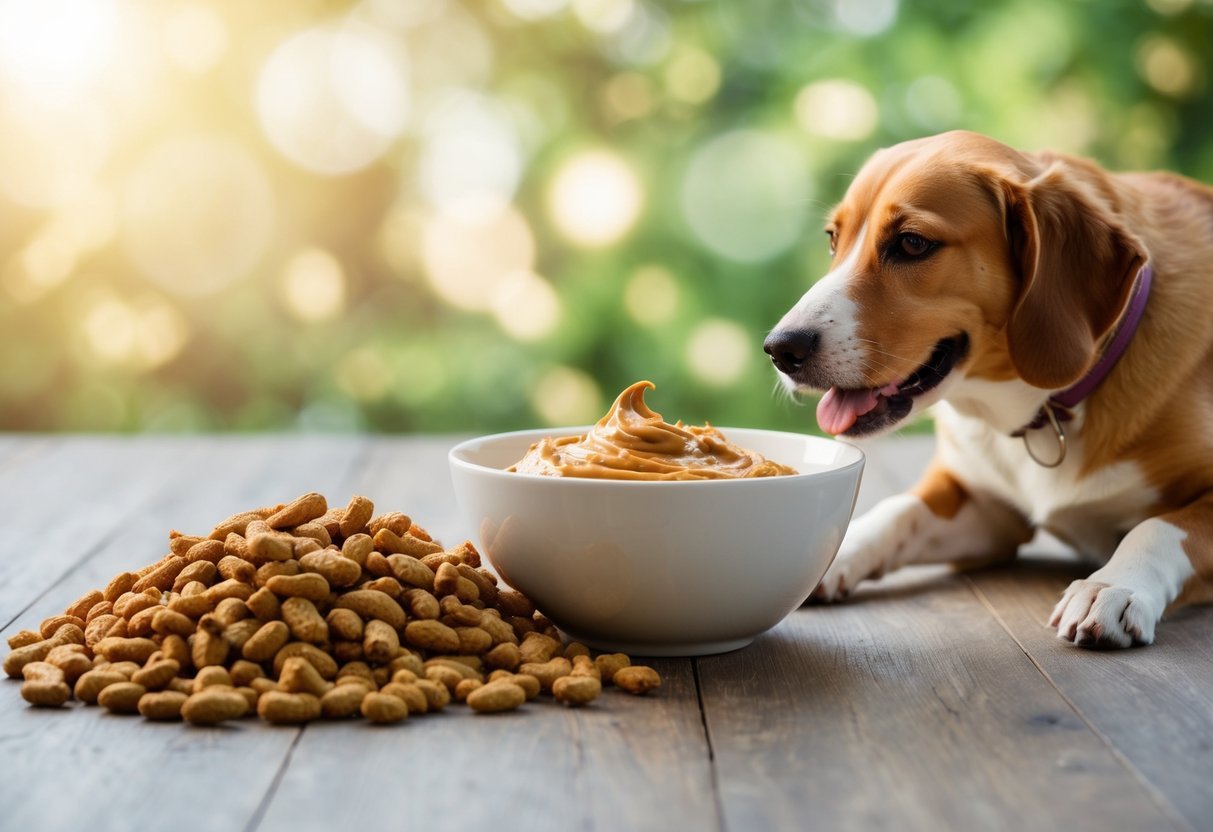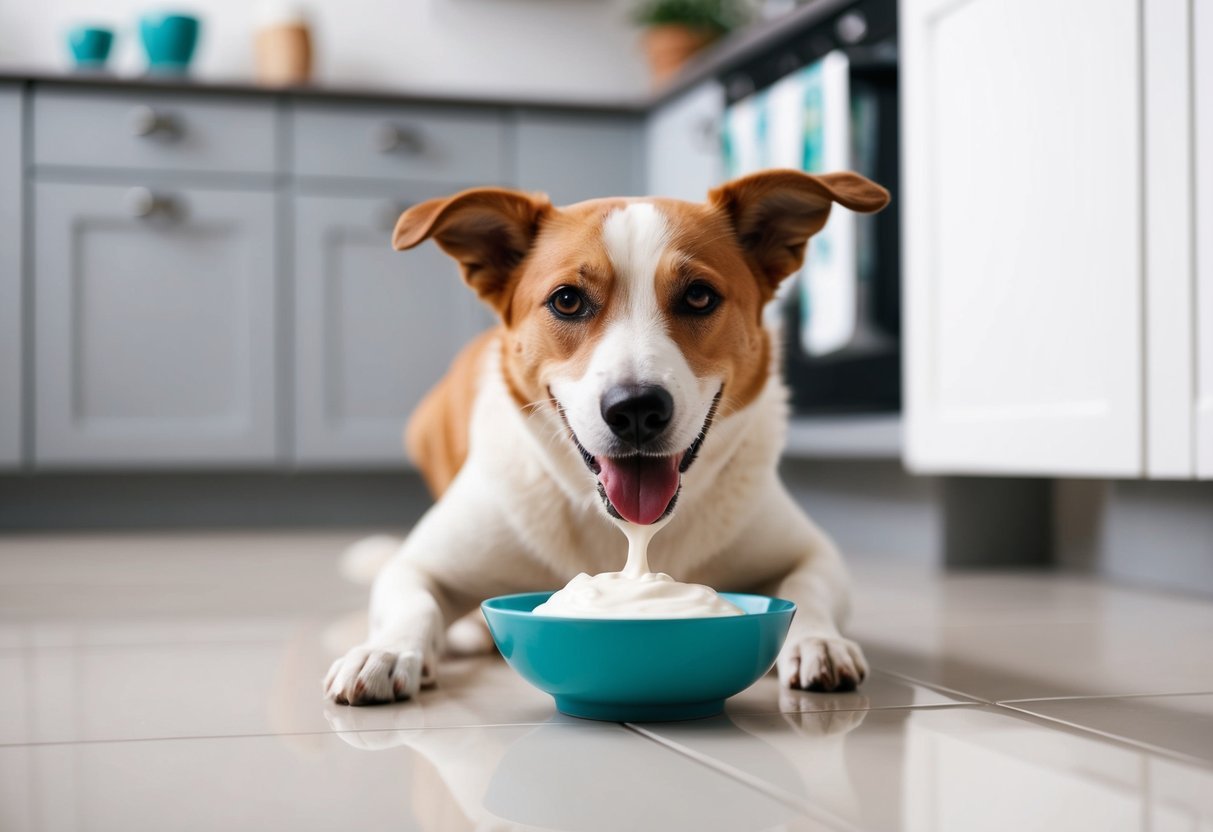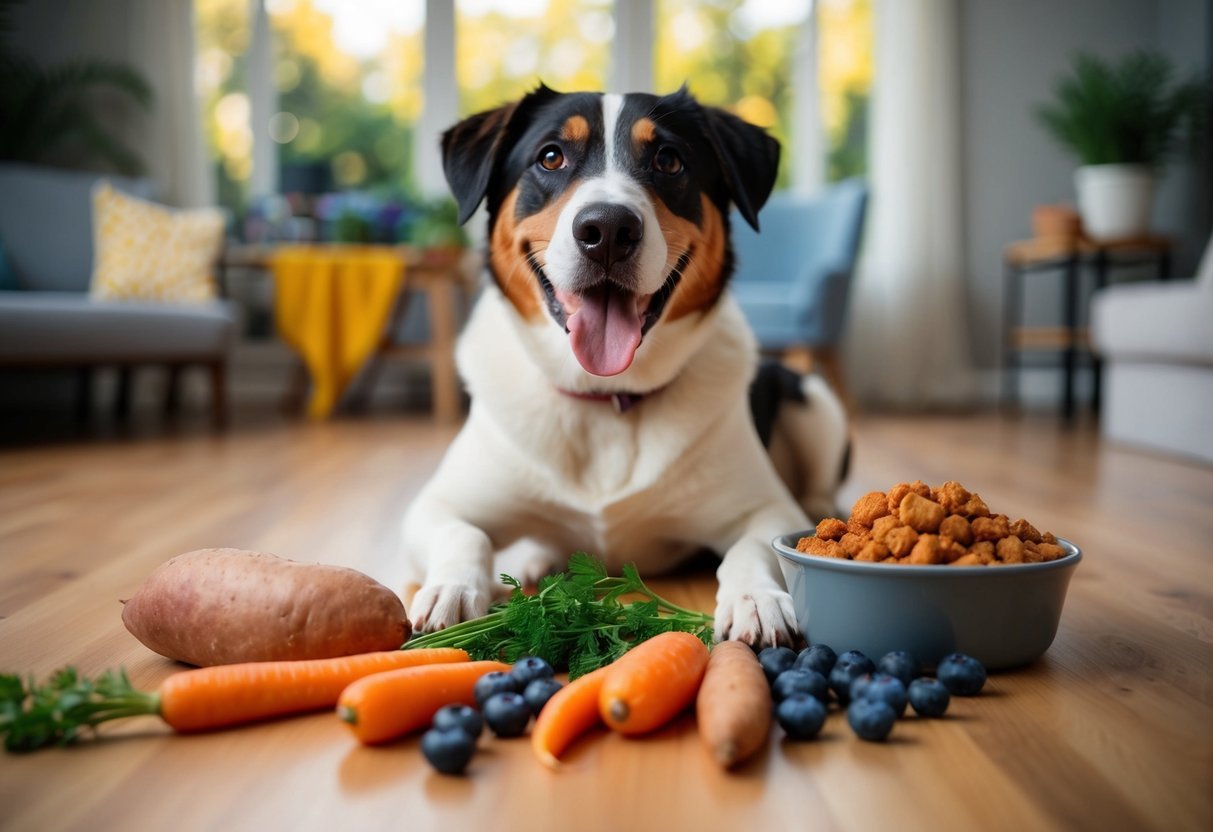When it comes to what your dog eats, you might wonder if there are healthier options than regular dog food.
Many people don’t realize that certain human foods can provide essential nutrients and benefits that store-bought dog food might lack. Understanding which foods are safe and nutritious for your dog can improve their overall health and happiness.
In this article, you’ll discover eight human foods that you can share with your dog.
These options not only taste great but can also enhance their diet.
So get ready to learn about tasty treats that your furry friend will love, while also giving them a nutrition boost!
1) Carrots

Carrots are a tasty and crunchy snack for your dog.
They are safe to eat, whether raw or cooked.
Many dogs enjoy munching on them, which can help keep their teeth clean.
These veggies are low in calories, making them a great option if your pup needs to lose weight.
Carrots are packed with vitamins and minerals, especially vitamin A, which is good for your dog’s eyes and skin.
Feeding your dog carrots can also add some variety to their diet.
Plus, giving them carrots can keep them occupied, especially when you want to keep them busy for a while.
To serve carrots, consider cutting them into bite-sized pieces to prevent choking.
Remember to wash and peel them first if you choose raw carrots.
This ensures they are clean and safe for your furry friend.
Including carrots in your dog’s diet can be a fun and healthy choice.
It’s a simple way to treat your dog with something nutritious that they will love.
Blueberries

Blueberries are a tasty and healthy treat for your dog.
They are full of vitamins and antioxidants that can help keep your pup’s immune system strong.
These small fruits are low in calories, making them a great snack option.
You can mix blueberries into your dog’s food or give them as a reward during training.
Many dogs enjoy the sweet and slightly tart flavor of blueberries.
They can also help improve heart health and support brain function.
Make sure to wash them well before feeding.
Just a few berries can be enough to give your dog a tasty boost.
Always keep an eye on your dog while they try new foods.
If your dog has never had blueberries before, start with a small amount to see how they react.
3) Pumpkin
Pumpkin is a great treat for your dog.
It is packed with fiber and nutrients that can help with digestion.
If your dog is having tummy troubles, a bit of pumpkin can make a big difference.
This gourd is low in calories, which makes it a healthy snack option.
You can serve it cooked or canned, but avoid any that has added sugars or spices.
Raw pumpkin might be tough for your pup to digest.
In addition to aiding digestion, pumpkin is rich in vitamins like A, C, and E. These vitamins can support your dog’s overall health and improve their skin and coat.
When feeding your dog pumpkin, start with a small amount.
Watch for any signs of allergies or an upset stomach.
If all goes well, you can include pumpkin in their diet regularly.
You can even mix it into their regular food for added flavor and nutrition.
Just be sure to keep it simple—plain pumpkin is best! For more information on the benefits of pumpkin, check out this useful guide.
4) Apples (without seeds)

Apples can be a tasty treat for your dog.
They are low in calories and packed with vitamins A and C. It’s important to remove the seeds and core before giving them to your dog.
The seeds contain cyanide, which is harmful to dogs.
Even if your dog only eats a few seeds, it’s best to avoid any risk.
Stick to the fleshy part of the apple.
Many dogs enjoy the crunchy texture.
You can slice them into small pieces or give them whole, depending on your dog’s size.
Just make sure you supervise them to prevent choking.
Apples are also great for freshening your pup’s breath.
They can help reduce plaque and tartar build-up, too.
Just remember that moderation is key.
These fruits can be a fun addition to your dog’s diet.
They provide a healthy snack option between meals.
Enjoy watching your furry friend munch on this sweet treat!
5) Sweet Potatoes
Sweet potatoes are a great choice for your dog.
They’re not toxic and can be a nutritious addition to their diet.
These root vegetables are full of vitamins and minerals that can benefit your furry friend.
They contain vitamins A, B6, and C, which help support your dog’s immune system and vision.
The high fiber content can also aid in digestion.
You can serve sweet potatoes to your dog cooked, mashed, or even in small chunks.
Just make sure to avoid adding any butter, salt, or spices.
Many high-quality dog foods include sweet potatoes for their health benefits.
If you’re looking to mix up your dog’s meals, sweet potatoes could be a tasty option.
Be sure to introduce new foods gradually.
This helps you watch for any negative reactions.
Overall, sweet potatoes can be a safe and healthy treat for your pup.
6) Peanut Butter (unsalted, unsweetened)

Peanut butter is a popular treat that many dogs love.
When giving it to your dog, make sure to choose an unsalted and unsweetened version.
This keeps it safe and healthy for them.
This tasty spread is a good source of protein and healthy fats.
It also contains vitamins E and B6, which are great for your dog’s overall health.
You can use peanut butter to hide pills your dog needs to take.
Just spread a little on the pill, and watch them gobble it up.
It can also keep your pup busy when stuffed in a toy.
Always check the label to ensure that the peanut butter does not contain xylitol.
Xylitol is toxic to dogs and can cause serious health issues.
A safe, dog-friendly option is natural peanut butter without any additives.
Remember to give it in moderation, as it is calorie-dense.
Too much can lead to weight gain.
Your dog will surely enjoy this fun and tasty treat!
7) Cooked Chicken

Cooked chicken is a tasty treat for your dog.
It’s a great source of protein, which helps keep their muscles strong.
Whether you serve it plain or mix it with their food, your dog is likely to love it.
Make sure the chicken is unseasoned.
Ingredients like garlic or onion can be harmful to dogs.
You want to stick with plain, cooked chicken to keep your pup safe.
Shredded chicken can be added to kibble or mixed with vegetables for a nutritious meal.
Many dogs enjoy it as a special topping.
You can also use cooked chicken as a training reward.
It’s delicious and motivates them to learn tricks or obey commands.
Just keep portions small to avoid too many calories.
Ba sure to remove all bones before feeding chicken to your dog.
Bones can splinter and pose a choking hazard or cause internal injuries.
Always prioritize your dog’s safety when sharing human food.
8) Plain Greek Yogurt

Plain Greek yogurt can be a tasty treat for your dog.
It’s packed with protein and beneficial probiotics, which can support your dog’s digestion.
Make sure to choose plain, unsweetened yogurt without any added sugars or artificial flavors.
Many dogs are lactose intolerant, so start with a small amount to see how your dog reacts.
If they show signs of upset stomach, such as gas or bloating, it’s best to avoid it.
You can mix a spoonful of yogurt into your dog’s regular food or serve it as a treat.
Your dog will likely enjoy the creamy texture and taste.
Always remember, moderation is key.
Too much yogurt can lead to digestive issues.
So, keep it as an occasional treat rather than a regular part of their diet.
If you have any doubts, consult your veterinarian before adding new foods to your dog’s meals.
Nutritional Benefits of Human Foods for Dogs

Feeding your dog human foods can provide essential nutrients that may be lacking in regular dog food.
Let’s look at some specific nutritional benefits these human foods can offer.
Vitamins and Minerals
Many human foods are packed with vitamins and minerals that support your dog’s health.
For instance, carrots are high in beta-carotene, which is great for eye health and immune function.
Spinach contains iron and vitamins A, C, and K, which help with energy and overall wellness.
Here’s a quick list of some beneficial human foods and their key nutrients:
- Blueberries: Rich in antioxidants and vitamin C, which help fight free radicals.
- Pumpkin: High in fiber and vitamins A and C, aiding digestion and boosting immunity.
- Sweet potatoes: A fantastic source of vitamin B6, potassium, and antioxidants.
These vitamins and minerals can enhance your dog’s diet and promote better health.
Protein Content
Protein is crucial for your dog’s growth, energy, and muscle health.
Many human foods offer high-quality protein sources.
For example, cooked chicken is lean and packed with protein, essential for reparation and overall health.
Consider these protein-rich options:
- Eggs: A complete protein source, eggs also contain essential fatty acids and vitamins.
- Fish: Salmon is not just tasty; it’s rich in omega-3 fatty acids, which support skin and coat health.
- Yogurt: A good source of protein and probiotics, which can help your dog’s digestion.
Integrating these protein sources can significantly benefit your dog, improving energy levels and muscle strength.
Potential Health Risks

Many human foods are safe for dogs to eat, but it’s important to be aware of possible health risks.
Some dogs can have allergies or sensitivities to certain foods, and overfeeding can lead to other health issues.
Understanding these risks can help you make safer choices for your furry friend.
Allergies and Sensitivities
Just like humans, dogs can be allergic to specific foods.
Common allergens include:
- Beef
- Chicken
- Dairy
- Wheat
- Eggs
If your dog shows signs of itching, vomiting, or digestive upset after eating new human food, it may indicate an allergy.
Always introduce new foods slowly.
It’s a good idea to keep track of what you’ve fed your dog to spot any potential reactions.
If you suspect an allergy, consult your vet.
They can help determine the cause and suggest an appropriate diet to ensure your dog stays healthy.
Overfeeding Concerns
Introducing human foods to your dog’s diet can lead to overfeeding if you’re not careful.
It’s important to keep portions small and balanced.
Overfeeding can cause obesity, which increases the risk of health issues like diabetes, heart disease, and joint problems.
A good rule of thumb is to limit treats to about 10% of your dog’s daily calories.
Make sure to adjust the amount of regular dog food you give to account for any human food.
Always monitor your dog’s weight and energy levels.
Regular vet check-ups can help you stay on track with their nutritional needs.
Adjust their diet accordingly to keep them fit and healthy.
Frequently Asked Questions

You might have some questions about feeding your dog human food.
This section covers what’s safe, what helps your pup feel full, and the foods you should avoid.
What are safe human foods to feed my dog when I’m out of dog food?
If you’re out of dog food, there are plenty of safe options.
Carrots, sweet potatoes, and apples without seeds make great snacks.
Blueberries and pumpkin are also good choices that won’t upset your dog’s tummy.
Which human foods can help my dog feel full and satisfied?
For a satisfying meal, consider sweet potatoes and pumpkin.
Both are high in fiber and can help your dog feel full.
Adding carrots or apples can also provide some crunch and taste.
Can I feed my dog human foods on a daily basis, and is it healthy?
You can feed your dog human foods daily, but moderation is key.
Stick to healthy options like fruits and vegetables.
Make sure these foods complement their regular diet and maintain a balance of nutrients.
What are some nutrient-rich human foods that are good for my dog?
Nutrient-rich options include carrots, blueberries, and pumpkin.
These foods are packed with vitamins and minerals.
They can support your dog’s health while adding variety to their meals.
What human foods are harmful to dogs and should be avoided?
Some foods are harmful to dogs and should be avoided.
Chocolate, grapes, and onions are toxic.
Always double-check if you’re unsure whether a food is safe for your furry friend.
Are there human foods that closely match the nutritional content of dog food?
Some human foods are nutritious, but they usually don’t match dog food exactly.
However, options like lean meats and certain vegetables can offer beneficial nutrients.
It’s best to use them as supplements to your dog’s regular diet.

